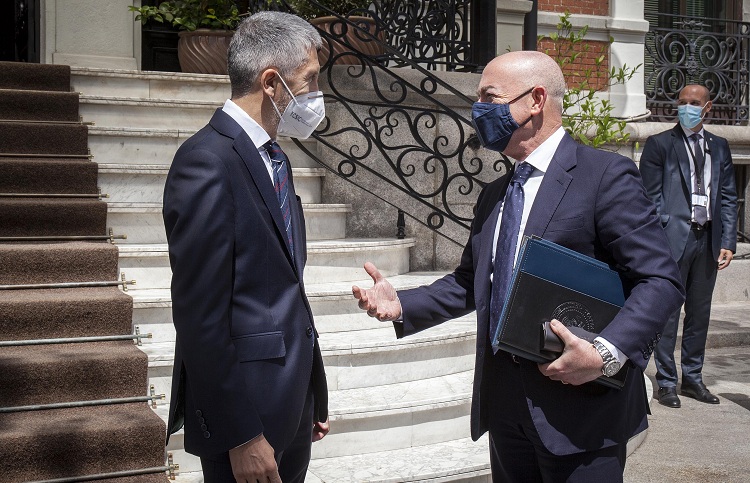Eduardo González
The official visit to Spain of the U.S. Secretary of Homeland Security, Alejandro Mayorkas, the first member of Joe Biden’s Administration to travel to our country, concluded yesterday with an agreement between the two countries to strengthen the exchange of information and good practices in the fight against cybercrime.
“Thank you for making a stop at our home, a gesture that we deeply appreciate and that demonstrates the great harmony that presides over the relations between both countries”, said the Minister of the Interior, Fernando Grande-Marlaska, during the joint press conference after meeting with Mayorkas at the Ministry’s headquarters.
According to the minister, during the meeting they addressed “issues of common interest that require close cooperation”, among them “a priority that both the US and Spain unfortunately know very well, such as the fight against terrorism and violent radicalization, a persistent threat that has found in the use of the Internet a powerful ally”. For this reason, the two ministers agreed to “increase cooperation to prevent the dissemination of terrorist content on the Internet,” said Marlaska. They also discussed “particularly close cooperation in the fight against organized crime“, as a result of which “we have made important achievements, mainly in drug trafficking, arms trafficking and cybercrime”.
One of the main points of the meeting between Grande-Marlaska and Mayorkas was the fight against cybercrime, which “has blurred the borders as we knew them until just a few years ago.” “Fighting these new forms of organized crime is a challenge that cannot be tackled individually by any country, the responses are global and therefore require joint efforts”, the Spanish minister explained.
“For this reason, with the experience of the National Cybersecurity Strategy that Spain approved in 2019, I have shared with Secretary Mayorka the need to strengthen ties between our Cybersecurity Coordination Office and the National Critical Infrastructure Protection Center (CNPIC) and its counterpart agencies in the United States”, Grande-Marlaska announced. “We want, therefore, to strengthen the exchange of information and best practices, as well as the training of our experts”, he added.
The two ministers also shared views on migratory flows and, in this regard, Grande-Marlaska recalled that “Spain, as an external border of the EU, maritime, air and land, reveals a unique reality that demands efficient management, as is also the case in the US”.
For his part, Alejandro Mayorkas expressed his wish that both countries can “deepen their cooperation and improve their alliance, of which we are so proud”. “Working together we can confront threats, such as violent extremism, cybersecurity, terrorism and transnational organized crime, threats that ignore borders”, he continued. “As we recover from the pandemic that has ravaged the world, we are preparing to take steps towards full openness between our two countries and between the U.S. and the EU more broadly”, he concluded.
Crisis with Morocco
Regarding the current crisis between Spain and Morocco, as Grande-Marlaska explained in response to a question on the subject, the two ministers spoke about “what happened, obviously, last May and we have not described it as a migratory crisis because it was not a migratory crisis”.
However, he declined to comment on the recognition by the United States of the Moroccan status of Western Sahara, a decision which, according to many analysts, has contributed to ignite the conflict with Spain. “It is other ministerial departments that are competent”, he said. “They are working with the silence and with the necessary strength to restore as soon as possible important relations, relations between friendly countries, between fraternal countries, which we have many things in common, many strategic challenges on which we have worked in an important way and on which we continue to work and will do so in the future always for the benefit of our respective societies”, he added. Mayorkas did not comment on the matter.
Before meeting with Grande-Marlaska, the US Secretary of Homeland Security – who has traveled this week to the Iberian Peninsula to represent the US at the Justice and Home Affairs Council of the European Union, held in Lisbon – met in Moncloa with the director of the Department of Homeland Security, General Miguel Ángel Ballesteros, and later met with the second vice-president and Minister of Economic Affairs and Digital Transformation, Nadia Calviño. On his arrival in Madrid he was received by the Chargé d’Affaires of the US Embassy, Conrad Tribble, who is in charge of the diplomatic representation while waiting for President Joe Biden to appoint the replacement for the last ambassador, Duke Buchan.







